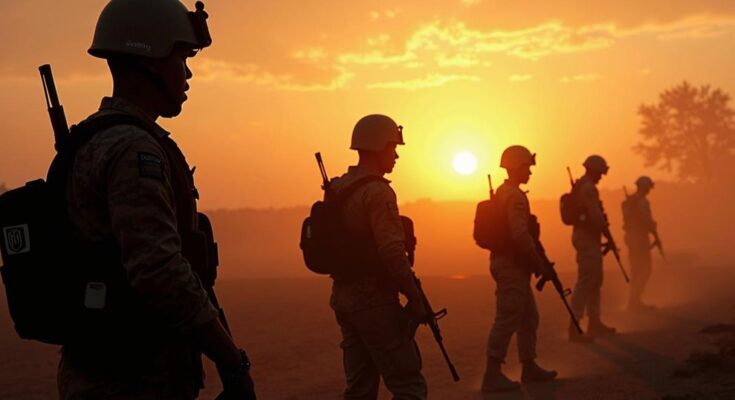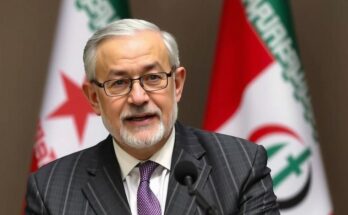The UN Security Council unanimously extended the Kenya-led MSS mission in Haiti for one year to support the country’s National Police in combating gangs. The U.S. retracted its proposal to convert the mission to a UN peacekeeping operation due to opposition from China and Russia. The mission currently faces severe personnel and funding shortages, with only 407 personnel deployed versus a target of 2,500. Although some countries have committed additional troops, financial contributions remain significantly below requirements, leading to concerns over the mission’s efficacy and past abuses by UN peacekeepers.
The United Nations Security Council has unanimously agreed to extend the mandate of the Kenya-led Multinational Security Support (MSS) mission in Haiti for an additional year, prolonging its operation originally set to conclude on October 2, 2024. This extension aims to bolster the capabilities of Haiti’s National Police (PNH) in their efforts to combat rampant gang violence and restore order in the beleaguered nation. However, the United States has officially withdrawn its earlier proposal to transition the MSS into a full-fledged UN peacekeeping operation due to substantial opposition from China and Russia. U.S. Ambassador to the UN, Linda Thomas-Greenfield, stated on X (formerly Twitter), “Today’s unanimous renewal sends a strong message to the people of Haiti: the world stands with you.” Presently, the MSS deploys a mere 407 personnel in Haiti’s capital, significantly short of the intended 2,500 needed to effectively manage security challenges. Compounding these issues is the mission’s critical funding shortfall; while the United States has committed nearly $300 million in equipment, the UN trust fund for the MSS has accrued only $67 million against an expected requirement of $84 million. The total projected annual expenditure for the MSS stands at approximately $600 million, provoking discontent among UN officials over the sluggish pace of financial support for the initiative. Canada ($45 million), the U.S. ($15 million), France, and Spain ($3 million each), among others, have pledged contributions, yet such amounts fall far short of what is necessary. Meanwhile, the security condition in Haiti deteriorates, with gangs exerting control over substantial portions of Port-au-Prince, hindering efforts to stabilize key institutions such as the State University of Haiti and the city’s port. In response to the international mission’s ongoing challenges, various nations have pledged additional personnel support. Guatemala is set to send 150 soldiers, and Guinea is preparing to deploy 650 police and military officers, though the specific timelines for these deployments remain uncertain. Guinea’s Prime Minister Amadou Oury Bah expressed this commitment at the UN General Assembly, stating, “We are committed to peacekeeping efforts and will send 650 officers to support stabilization in Haiti.” The U.S. had initially advocated for the transformation of the MSS into a UN peacekeeping mission to secure more reliable funding and resources. This proposal was ultimately abandoned after threats of veto from China and Russia, arguing for a more extended evaluation period for the MSS before such a change could be enacted. Conversely, the Transitional Presidential Council (CPT) of Haiti expressed support for a UN mission conversion. CPT President Edgard Leblanc urged the UN to assume responsibility in Haiti’s reconstruction, stating, “It is never too late to act rightly and learn from past mistakes.” However, the prospect of a UN peacekeeping force is met with skepticism in Haiti, particularly due to the historical context of previous UN missions. Attorney Brian Concannon, executive director of the Institute for Justice and Democracy in Haiti, highlighted the community’s hesitance based on the MINUSTAH era, characterized by significant abuses, including a cholera outbreak and sexual misconduct scandals. Concannon noted the absence of accountability mechanisms in the current mission and imparted concerns regarding the potential outcomes of another UN intervention. Despite existing obstacles, the U.S. maintains its commitment to advocating for the future transformation of the MSS into a UN peacekeeping mission. Ambassador Thomas-Greenfield confirmed this intention, stating, “Going forward, we must heed the calls from the Haitian government to transform the Mission into a UN peacekeeping operation.”
The situation in Haiti remains precarious, as the country battles extensive gang violence and socio-political instability. The Multinational Security Support mission, led by Kenya, was created to assist Haiti’s National Police in restoring security. This mission is essential amid a difficult backdrop of personnel shortages and inadequate funding, crucial for effectively managing the security crisis in Port-au-Prince. The debate over transforming the mission into a UN peacekeeping operation underscores the international community’s complexity in addressing these challenges, especially in light of historical failures associated with prior UN missions. The dynamics among the UN Security Council members, particularly the dissent from China and Russia, highlight the geopolitical considerations influencing decisions regarding international interventions in Haiti.
In conclusion, the UN Security Council’s extension of the Kenya-led MSS mission reflects a collective commitment to supporting Haiti amidst its ongoing security crisis. However, significant challenges persist, particularly regarding personnel shortages and funding. The congressional dynamics surrounding the transformation of the mission into a UN peacekeeping effort illustrate the complexities faced in international response to Haiti’s needs. As the situation continues to evolve, the call for accountability and efficient use of international resources remains critical to restoring stability in the nation.
Original Source: haitiantimes.com




